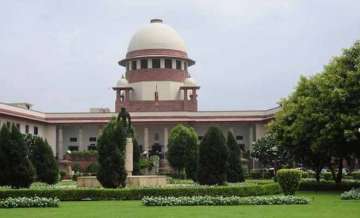The Supreme Court on Thursday rescheduled the hearing in the Ram Janmabhoomi-Babri Masjid land title dispute after Justice U U Lalit recused himself from the case.
The apex court will now constitute a new bench in the case. The court has fixed January 29 as the next date for hearing in the matter.
Justice U U Lalit recused himself from the case after senior advocate Rajeev Dhavan, appearing for a Muslim party, pointed out that he had appeared for former Uttar Pradesh chief minister Kalyan Singh in 1994.
Though Dhavan said he was not seeking recusal of Justice Lalit, the judge himself opted out the hearing the matter.
The bench, also comprising Justices S A Bobde, N V Ramana and D Y Chandrachud, noted the submissions made by Dhavan.
Dhavan also drew the attention of the bench to the fact that the matter was earlier fixed for hearing before a three-judge bench but the CJI took a decision to list it before a five-judge Constitution Bench.
He further submitted that there was need for a judicial order to set up a five-judge Constitution bench.
Watch | Ayodhya land dispute: New bench to be constituted on January 29
The CJI, however, quoted Supreme Court rules mandating that any bench should comprise two judges and there was nothing wrong in constituting a five-judge Constitution bench.
The CJI said in view of the the facts and circumstances of the matter and the voluminous records pertaining to it, this was a fit case for constituting a five-judge bench.
In its order, the bench said the apex court registry will physically examine the records stored in 50 sealed trunks in the room, which has also been kept sealed.
The top court said the records pertaining to the matter are voluminous and some of the documents are in Sanskrit, Arabic, Urdu, Hindi, Persian and Gurmukhi that need to be translated.
If required, the apex court registry can take the service of official translators, the bench said.
On September 27 last year, a three-judge bench of the top court by 2:1 majority refused to refer to a five-judge Constitution bench reconsideration of the observations in its 1994 judgement that a mosque was not integral to Islam. The matter arose during the hearing of the Ayodhya land dispute.
When the matter was last taken up on January 4, there was no indication that the case would be referred to a Constitution bench as the apex court had simply said further orders in the matter would be passed on January 10 by “the appropriate bench, as may be constituted”.
As many as 14 appeals have been filed in the apex court against the 2010 Allahabad High Court judgement, delivered in four civil suits, that the 2.77-acre land be partitioned equally among the three parties—the Sunni Waqf Board, the Nirmohi Akhara and Ram Lalla.
Watch: India TV debate on Ayodhya land dispute hearing
Latest India News
